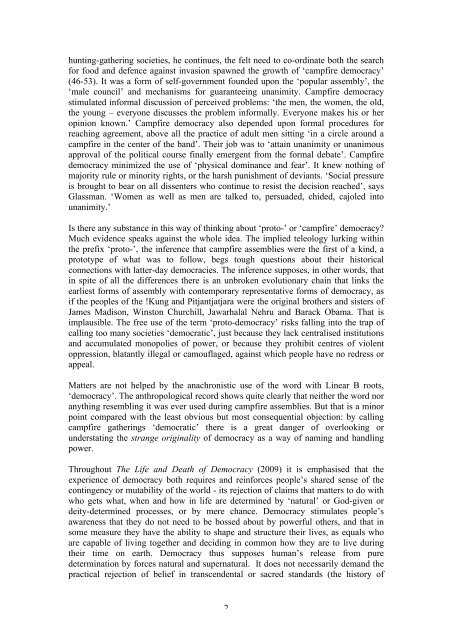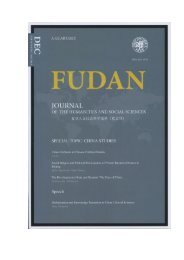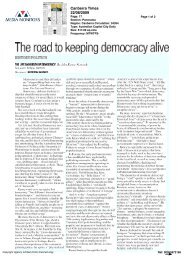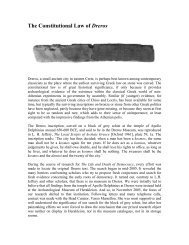Campfire Democracy? - The Life And Death Of Democracy
Campfire Democracy? - The Life And Death Of Democracy
Campfire Democracy? - The Life And Death Of Democracy
You also want an ePaper? Increase the reach of your titles
YUMPU automatically turns print PDFs into web optimized ePapers that Google loves.
hunting-gathering societies, he continues, the felt need to co-ordinate both the search<br />
for food and defence against invasion spawned the growth of ‘campfire democracy’<br />
(46-53). It was a form of self-government founded upon the ‘popular assembly’, the<br />
‘male council’ and mechanisms for guaranteeing unanimity. <strong>Campfire</strong> democracy<br />
stimulated informal discussion of perceived problems: ‘the men, the women, the old,<br />
the young – everyone discusses the problem informally. Everyone makes his or her<br />
opinion known.’ <strong>Campfire</strong> democracy also depended upon formal procedures for<br />
reaching agreement, above all the practice of adult men sitting ‘in a circle around a<br />
campfire in the center of the band’. <strong>The</strong>ir job was to ‘attain unanimity or unanimous<br />
approval of the political course finally emergent from the formal debate’. <strong>Campfire</strong><br />
democracy minimized the use of ‘physical dominance and fear’. It knew nothing of<br />
majority rule or minority rights, or the harsh punishment of deviants. ‘Social pressure<br />
is brought to bear on all dissenters who continue to resist the decision reached’, says<br />
Glassman. ‘Women as well as men are talked to, persuaded, chided, cajoled into<br />
unanimity.’<br />
Is there any substance in this way of thinking about ‘proto-’ or ‘campfire’ democracy<br />
Much evidence speaks against the whole idea. <strong>The</strong> implied teleology lurking within<br />
the prefix ‘proto-’, the inference that campfire assemblies were the first of a kind, a<br />
prototype of what was to follow, begs tough questions about their historical<br />
connections with latter-day democracies. <strong>The</strong> inference supposes, in other words, that<br />
in spite of all the differences there is an unbroken evolutionary chain that links the<br />
earliest forms of assembly with contemporary representative forms of democracy, as<br />
if the peoples of the !Kung and Pitjantjatjara were the original brothers and sisters of<br />
James Madison, Winston Churchill, Jawarhalal Nehru and Barack Obama. That is<br />
implausible. <strong>The</strong> free use of the term ‘proto-democracy’ risks falling into the trap of<br />
calling too many societies ‘democratic’, just because they lack centralised institutions<br />
and accumulated monopolies of power, or because they prohibit centres of violent<br />
oppression, blatantly illegal or camouflaged, against which people have no redress or<br />
appeal.<br />
Matters are not helped by the anachronistic use of the word with Linear B roots,<br />
‘democracy’. <strong>The</strong> anthropological record shows quite clearly that neither the word nor<br />
anything resembling it was ever used during campfire assemblies. But that is a minor<br />
point compared with the least obvious but most consequential objection: by calling<br />
campfire gatherings ‘democratic’ there is a great danger of overlooking or<br />
understating the strange originality of democracy as a way of naming and handling<br />
power.<br />
Throughout <strong>The</strong> <strong>Life</strong> and <strong>Death</strong> of <strong>Democracy</strong> (2009) it is emphasised that the<br />
experience of democracy both requires and reinforces people’s shared sense of the<br />
contingency or mutability of the world - its rejection of claims that matters to do with<br />
who gets what, when and how in life are determined by ‘natural’ or God-given or<br />
deity-determined processes, or by mere chance. <strong>Democracy</strong> stimulates people’s<br />
awareness that they do not need to be bossed about by powerful others, and that in<br />
some measure they have the ability to shape and structure their lives, as equals who<br />
are capable of living together and deciding in common how they are to live during<br />
their time on earth. <strong>Democracy</strong> thus supposes human’s release from pure<br />
determination by forces natural and supernatural. It does not necessarily demand the<br />
practical rejection of belief in transcendental or sacred standards (the history of<br />
2







